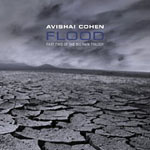Home » Jazz Articles » Profile » Jessica Williams
Jessica Williams
Williams is such a vast repository of modern mainstream jazz piano that she is difficult to categorize. She is a gifted composer of over 300 songs who is better known for her imaginative command of the Great American Songbook. She is a lyric poet of the piano who loves the soft pedal but can swing hard enough to knock you down. She is among the important living piano interpreters of Monk and Coltrane.
 It is in this last capacity that Williams will make a rare New York appearance at Dizzy's Club this month. The three nights (part of the 4th Annual Diet Coke Women In Jazz Festival) are billed as "The Music Of John Coltrane." The saxophonist's compositions frequently show up on Williams' recordings and she has dedicated an entire album to him. But she says, "Don't expect me to play 'Giant Steps' for three nights. The spirit of Coltrane is creativity—being yourself. Most of the tribute will consist of tunes that I have written for Coltrane. Unless you can bring something of yourself to a tune, why do it? I don't make setlists, but I know I will play 'Naima' because I have something special to say on it. I will probably play 'Wise One' because I have my own way of doing it. I play 'Lonnie's Lament' like a drone and take it to a very Eastern place. But a lot of Coltrane's stuff I won't play because it's been done perfectly. It would be like trying to paint [Picasso's] 'Guernica' again."
It is in this last capacity that Williams will make a rare New York appearance at Dizzy's Club this month. The three nights (part of the 4th Annual Diet Coke Women In Jazz Festival) are billed as "The Music Of John Coltrane." The saxophonist's compositions frequently show up on Williams' recordings and she has dedicated an entire album to him. But she says, "Don't expect me to play 'Giant Steps' for three nights. The spirit of Coltrane is creativity—being yourself. Most of the tribute will consist of tunes that I have written for Coltrane. Unless you can bring something of yourself to a tune, why do it? I don't make setlists, but I know I will play 'Naima' because I have something special to say on it. I will probably play 'Wise One' because I have my own way of doing it. I play 'Lonnie's Lament' like a drone and take it to a very Eastern place. But a lot of Coltrane's stuff I won't play because it's been done perfectly. It would be like trying to paint [Picasso's] 'Guernica' again."Williams was born in Baltimore, studied at the Peabody Conservatory and moved to Philadelphia in her teens, where she worked with Philly Joe Jones. She has mostly lived on or near the West Coast since the '70s—which may partially explain why, despite her enormous talent and her discography of approximately 78 albums, she has remained somewhat under the radar. But while her fan base may not be large, it is uncommonly devoted. Williams, in fact, has her own cult.
The best way to experience the passion of that cult is to attend one of Williams' frequent 'house concerts.' As venues have become scarcer for jazz, private homes have provided a surprisingly viable option, often with good grand pianos and unparalleled intimacy for audiences of 50-or-so. At a recent concert in a home in University Place, Washington, this writer witnessed the bond that exists between Williams and her followers. It begins with Williams' personal and musical manner. She speaks without forethought, wonders aloud what to play next and sometimes decides to stop and start over. Her chops are epic, but always sound human, never mechanical. When she feels her way into a song it is a highly exposed undertaking. You can hear Williams thinking, hear her trying things. Her creative process is interactive by nature. When she breaks through, say, on "I Can't Get Started" and finds elegant designs and new details distantly related to the song, her listeners feel that they have made the discovery with her.
In the large living room in University Place, for a rapt audience, she played "Reflections" by Monk and it did not flow but moved in hesitant forays and sudden thrusts and pooling tremolos. And when she played "Wise One," it was a glimpse into what she will unfold and explore much more fully at Dizzy's. When Williams strummed the piano strings and set out dark, portentous chords and streamed notes in fast runs, she made reference to Coltrane's sound and pent-up power without trying to replicate it. It was a translation of Coltrane into her own piano language, a personal meditation on the feeling embodied in his music. Like everything she plays, it could have come only from her.
 She says that she mostly refuses to play clubs because "things tend to bother me. Not everyone is facing in the same direction. I get distracted by the noise level." She makes a few exceptions for clubs that have the "right ambience"—Yoshi's in Oakland, California, the Triple Door in Seattle and now Dizzy's. She will appear at the latter with the world-class rhythm section that played on her two volumes of Live at Yoshi's (MAXJAZZ). Of bassist Ray Drummond, Williams says, "The force of his playing and his time are unquestionable. 'One' is where 'one' is and it's where Ray is and everybody knows it." She also says, "Victor Lewis is the best drummer for my playing because he is triplet-based. Victor is all angles and planes. It's slippin' and slidin.' I call it dancin' and I love to dance."
She says that she mostly refuses to play clubs because "things tend to bother me. Not everyone is facing in the same direction. I get distracted by the noise level." She makes a few exceptions for clubs that have the "right ambience"—Yoshi's in Oakland, California, the Triple Door in Seattle and now Dizzy's. She will appear at the latter with the world-class rhythm section that played on her two volumes of Live at Yoshi's (MAXJAZZ). Of bassist Ray Drummond, Williams says, "The force of his playing and his time are unquestionable. 'One' is where 'one' is and it's where Ray is and everybody knows it." She also says, "Victor Lewis is the best drummer for my playing because he is triplet-based. Victor is all angles and planes. It's slippin' and slidin.' I call it dancin' and I love to dance."For those who wish to expand their knowledge of Williams' life and art by reading about her, there is a special resource: jessicawilliams.com. Many jazz musicians have websites now, of course, but there are few that provide a self-portrait so complete and so intimate. Williams' website contains the standard biography and schedule and newsletter and there are 40 of her titles available for purchase. But the photos section is enormous, including whole galleries devoted to her pets and there is detailed technical information (and photos) of her home recording studio. The website also contains "The Collected Writings Of Jessica Williams"—over 100 essays and poems and journal entries. They reveal that Jessica Williams is a uniquely creative mind and spirit, not only in her music, but also in the enormous number of subjects she has deeply thought and cared about.
Who better to interpret John Coltrane?
Recommended Listening:
Jessica Williams, Arrival (Jazz Focus, 1993)
Jessica Williams, Gratitude (Candid, 1995)
Jessica Williams, In The Key Of Monk (Jazz Focus, 1997)
Jessica Williams, Live at Yoshi's, Vol. 1 & 2 (MAXJAZZ, 2003)
Jessica Williams, For John Coltrane (Red & Blue, 2004)
Jessica Williams, Songs for a New Century (Origin, 2008)
Tags
PREVIOUS / NEXT
Support All About Jazz
 All About Jazz has been a pillar of jazz since 1995, championing it as an art form and, more importantly, supporting the musicians who make it. Our enduring commitment has made "AAJ" one of the most culturally important websites of its kind, read by hundreds of thousands of fans, musicians and industry figures every month.
All About Jazz has been a pillar of jazz since 1995, championing it as an art form and, more importantly, supporting the musicians who make it. Our enduring commitment has made "AAJ" one of the most culturally important websites of its kind, read by hundreds of thousands of fans, musicians and industry figures every month.


























